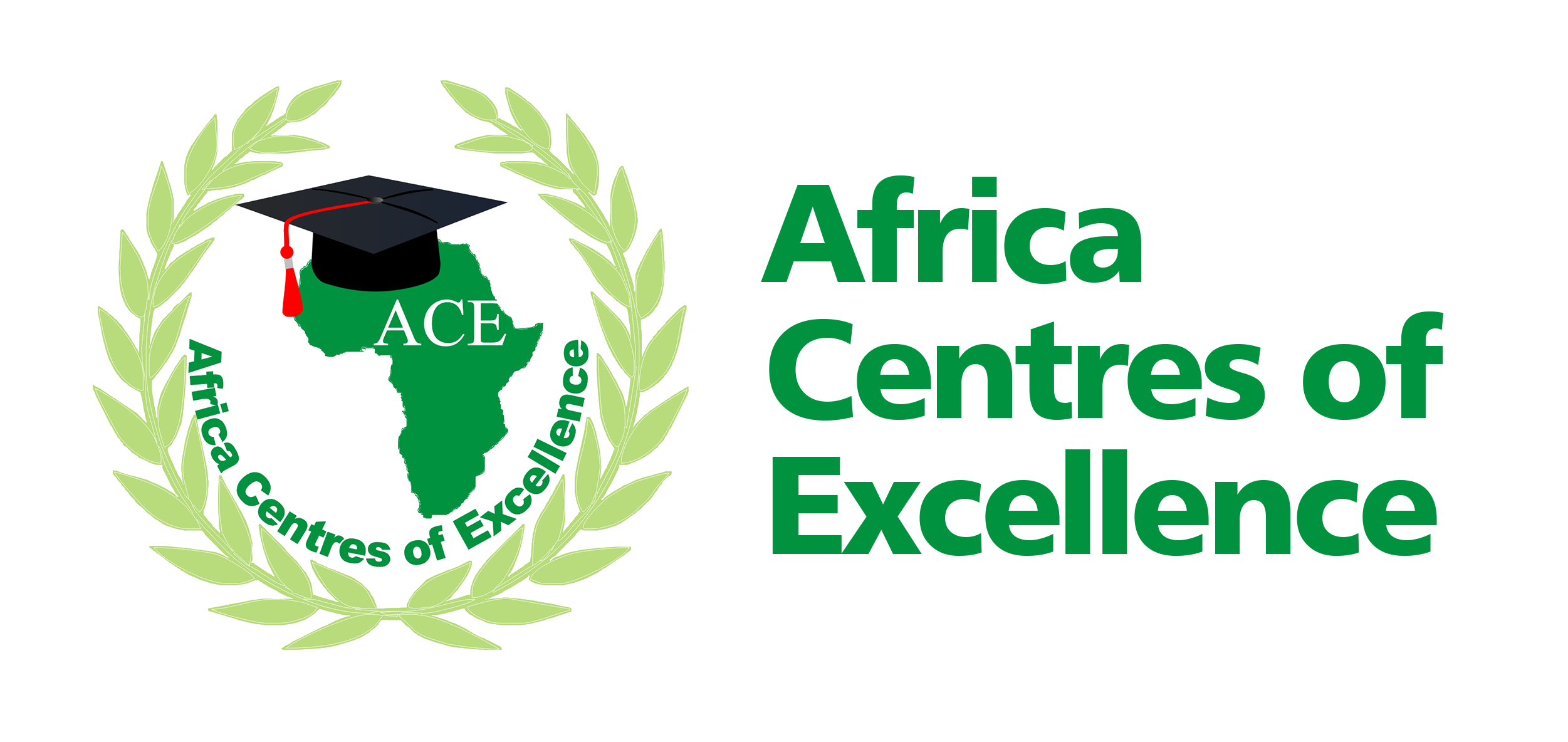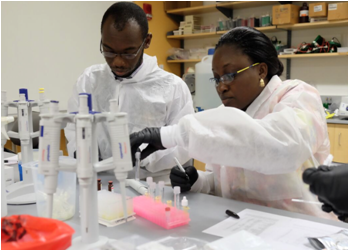The Africa Centre of Excellence for Genomics of Infectious Diseases (ACEGID), Redeemer’s University (RUN), Ede, has successfully developed a prototype for Next Generation Multiplex Pan-Lassa virus 10-minute Rapid Diagnostics test. According to the Centre, the prototype has since been validated at the University’s clinical testing centre at the Irrua Specialist Teaching Hospital, Edo State, Nigeria. The Centre has also identified four highly specific antibodies that would significantly inhibit the Lassa virus in-vitro, by targeting specific epitopes in the virus.
The discovery was an outcome of recent sequencing of over 220 Lassa viruses (published in Cell, 2015). The antibodies were obtained from four out of 133 Lassa fever survivors and the findings have provided the first evidence for the application of Immunotherapy (treatment with antibodies) against Lassa fever virus. The research outcome has paved the way for the development of the next Lassa fever vaccine, as the Centre is currently working on the new vaccine. The manuscript containing the data on the discovery has been submitted for publication in the Nature Immunology Journal.
It would be recalled that ACEGID recorded a similar research feat when its laboratory was used in the diagnosis of the Ebola virus during the 2014 Ebola Virus Disease epidemic, which resulted in the rapid containment of the disease in Nigeria. Working with other researchers in the academia and industry, ACEGID has developed the first Ebola Rapid Diagnostics test (REBOVTM ). The test is a 15-minute Rapid Diagnostics test that has been approved by the World Health Organisation (WHO) and the United States of America’s Food and Drug Administration (FDA). The deployment of this test was the breakthrough for the containment of Ebola virus disease in West Africa.
ACEGID researchers have also discovered two new Rhabdoviruses (EKV-1 and EKV-2) which share similarities with the rabies virus and the Bas-Congo virus that was shown to cause haemorraghic fever in the Democratic Republic of Congo (DRC) in 2012. Following the discovery, the research team immediately developed diagnoses for the detection of these two viruses. Due to laboratory involvement in the diagnoses of these diseases, ACEGID was contacted in October 2015, for the diagnosis of Ebola in a suspected patient from the University of Calabar, but the result turned out to be negative. The Centre further carried out metagenomic analysis on the sample, to determine the presence of other pathogens responsible for the illness and death of the individual. The laboratory analysis revealed that the patient was heavily infected with chicken pox virus (over 6.2 million viral copies/ml). This has lent credence to the Centre’s Mission and Goal, which is to develop the tools that will be deployed in the event of infectious diseases outbreaks. To support its research work on infectious diseases, ACEGID has received One Million US Dollars ($1,000,000) grant from Illumina Inc, for four Next Generation sequencers to be installed across West Africa. The Centre also received Five Hundred Thousand US Dollars ($500,000) grant from the United States Aid for International Development (USAID), to support the procurement of reagents for Next Generation sequencers.
To enhance its performance as a Centre of Excellence, the first functional MiSeq Genomics sequencing machine in West Africa was installed at the ACEGID Laboratory. The Centre has upgraded and equipped its old Laboratory at the University’s old campus and its scientists and laboratory technicians have been trained on deep sequencing of organisms. With this development, scientists in Nigeria will no longer send their samples overseas for sequencing, as this can be done at the Centre. These research outputs have resulted in the publication of 20 articles in peer review international high impact journals such as, New England Journal of Medicine (impact factor 55.8), Nature (impact factor 41.45), Science (impact factor 35.61), Cell (impact factor 32.24), Genome Biology (impact factor 10.85), among others.
On the aspect of knowledge delivery, students of RUN and its partner institutions are learning Genomics right here in Africa, as ACEGID has created, on its website, an open access educational video section, where research and academic communities can learn about Genomics and its application to infectious diseases. ACEGID’s on-site workshop programme also provides core training in technical procedures, study management; fundamental scientific concepts; paper and oral presentations as well as community engagement. The Centre has, in the past two years, developed a sustainable ICT transferrable curriculum for short courses and workshops, which cover laboratory procedures; RNA and DNA extraction; host genetics and association; sequencing and sample preparation as well as shipping and laboratory safety.
ACEGID report also indicates that in the last and current academic year, the Centre has enrolled 32 students, out of which 20 are national, while 12 are regional/international students. These students are undergoing postgraduate degree programmes in Microbiology, Parasitology and Pharmacology, where they are employing cutting-edge Genomic tools in their research projects. In addition, ACEGID has trained 76 participants at different short-term trainings in its Laboratory in Nigeria and at its collaborating institution in Dakar, Senegal. The trainings covered areas such as, Basic Training in Molecular Biology, Applications of Molecular Biology and PCR technique, among others.
ACEGID also offers short-term courses in Molecular Biology and Genomics of infectious diseases. Other learning opportunities provided by the Centre include:
- General Laboratory safety at Harvard University
- BL3 field site training at Broad Institute
- Glove Box tutorial
- NIEDL BL-4 Laboratory tour
- Foundations of Genomic Technology
- Lassa Diagnostics: Clinical
- Applications of molecular technology
- Foundations of PCR
- Introduction to Molecular Cloning
- Basic Biological Processes
- Microbiology Theory
- Genomic Diagnostic Tools
- PCR
- Deep sequencing on illumina sequencing platform
- Bio-informatics
- Teaching pedagogy
In addition, RUN has engaged the services of four visiting faculty from Harvard University, Broad Institute and Massachusetts Institute of Technology (MIT), as adjunct staff to train in the proposed Molecular Biology and Genomics postgraduate degree programme. ACEGID Laboratory was visited by some foreign scholars, Doctors Sarah Winnicki, Nathan Nyozwiak and Pardis Sabeti as well as Mr. Dolo Nosariemen, from Harvard University, Broad Institute of Harvard and MIT, to train for three weeks, on RNA isolation and purification in preparation for deep sequencing. ACEGID also attracted visits from renowned international and development partners, including the research teams from United States’ Center for Disease Control (CDC), Military Research Programme (MRP); Walter Reed Army Institute of Research (WRAIR), Harvard University, Broad Institute of Harvard and MIT. Others are Tulane University, Harvard Medical School, WHO/TDR and the United States’ Public Broadcasting Service
As a Centre of Excellence, ACEGID recognised the need for cutting-edge technologies in the field of Genomics and therefore, has purchased and installed the following equipment to enhance its performance:
- Illumina Sequencing machine
- EcoMachine
- Roche Real time PCR Machine
- Thermal cycler
- Gel Documentation device
- Nano drop
- Water purification system (MilliQ)
- ELISA
- Fridges
- Freezers
- Biosafety, Class II Laminar flow Hood
- Weighing Balances
- Electrophoresis equipment
- Table top Centrifuges
- Microcentrifuges
Recently, some ACEGID researchers received outstanding awards, both nationally and globally, in recognition of their remarkable contributions to health. These scholars and their awards are as follows:
- Professor Christian Happi RUN Vice-Chancellor Hero Award
RUN Researcher of the year Award
- Professor Pardis Sabeti 2014 Times Magazine 100 most influential people in the world
- Humar Sheik Khan 2014 Nature’s 10 most influential Scientists

Advanced Genomics Training

